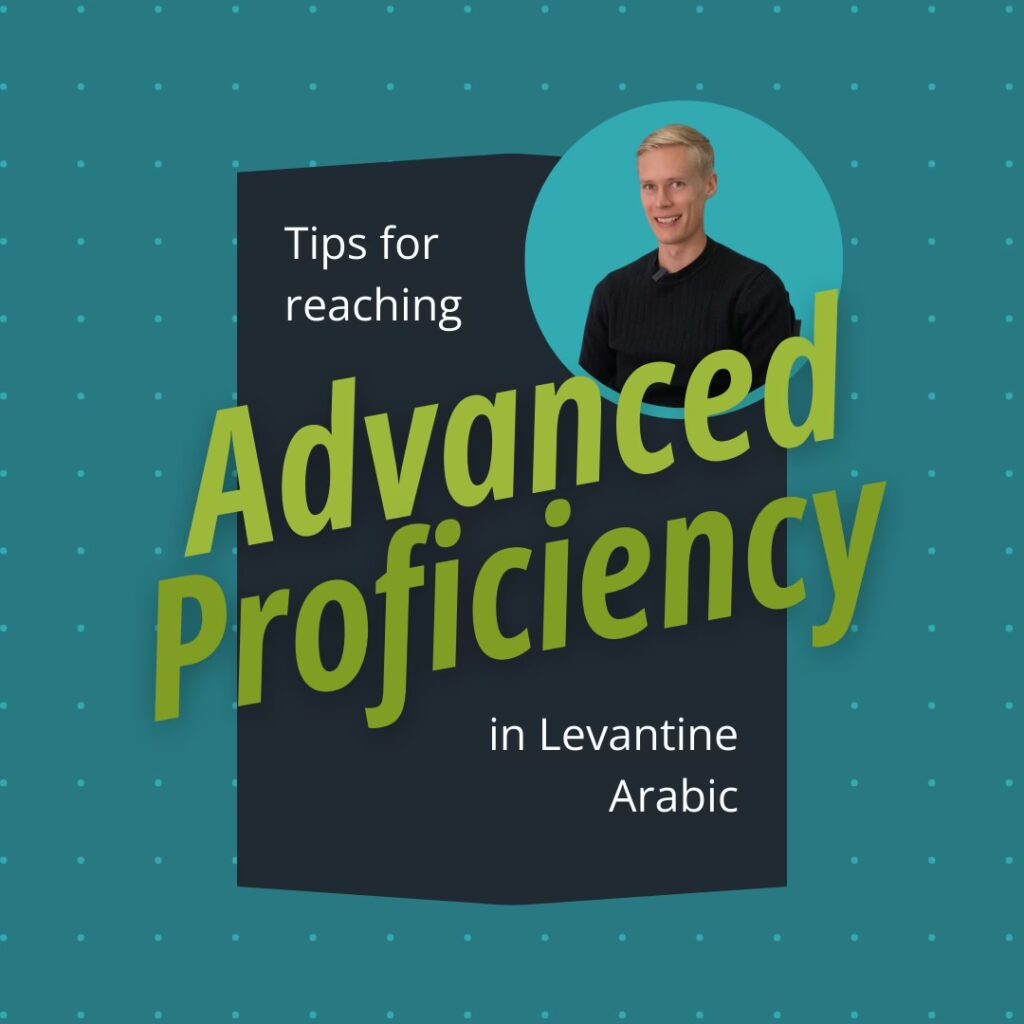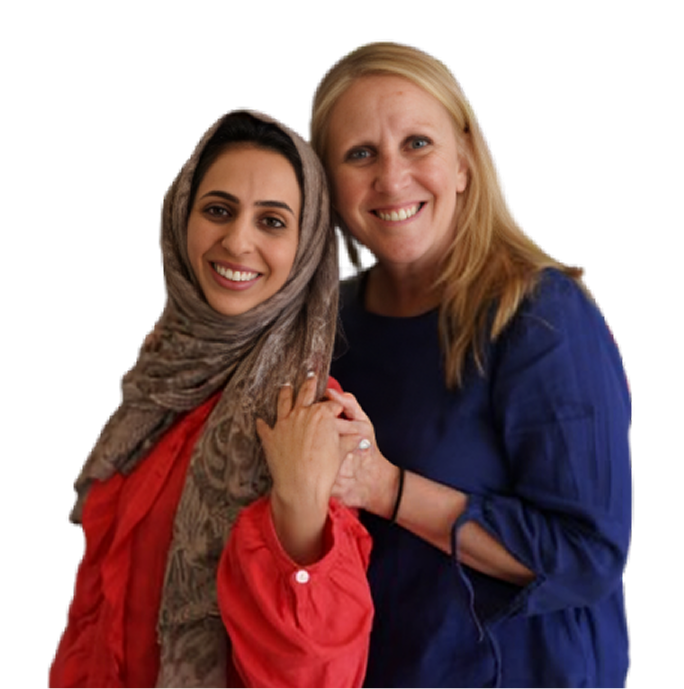Home » Arabic Learning Tips » Tips for Reaching Advanced High Proficiency OPI in Arabic

Click PLAY above to listen to this episode. Below is an edited transcript of the episode.
Subscribe to the podcast:
Jenn: Greetings from Amman, Jordan, and welcome to Tips for Learning Levantine Arabic. Today, we have the pleasure of hearing from Ethan, who arrived in Jordan just over two years ago with a passion for international business and a desire to immerse himself in a diverse culture. In fact, he just received a rating of “advanced high” on the OPI, which is an Oral Proficiency Interview. This assessment measures spoken language proficiency, and he achieved an advanced rating after 1440 hours of study. Here’s a link where you can find more information about being assessed through these official means.
Nour, a member of our staff, conducted this interview. First of all, I want to apologize for the sound quality when she asks questions; it was a bit low so we had to boost it in post production. This interview was initially intended to be just an Instagram reel, but the entire interview turned out so well that we wanted you to hear the full length of it. Ethan shares his experiences of overcoming challenges and achieving advanced proficiency in Levantine Arabic, as well as the profound personal and professional impact this journey has had on him. He also offers valuable advice for anyone considering a move to the Middle East. Listen closely to hear about Ethan’s language learning strategies and techniques he used to improve his spoken Arabic.
Ethan: My name is Ethan. I arrived in Jordan a little over two years ago. I studied international business and have had aspirations for a while to work internationally. I would love to work in a business management role where I can engage with multiple cultures and connect them together. I started at Shababak right after I arrived in Jordan—basically the week after I got here. I’ve been studying here for two years, and about every six months, I would test my level to see if I was making progress and get suggestions for improvement. Within those two years, I was able to reach an “advanced high” proficiency on the OPI, which was a huge personal achievement. I was super excited to receive that test score back. Even though I decided to learn Arabic for professional reasons, it has also brought many personal benefits, and I’ve loved the world that it has opened up for me with Arabic speakers that I can now interact with.
Nour: So how has your experience been in Jordan so far? What advice would you give someone who is hesitant about coming to the Middle East?
Ethan: I’ve absolutely loved living in Jordan. Honestly, from the first day that I was here interacting with people, I noticed how cared for I felt as a foreigner; people really do watch out for you when you’re in a place where you obviously don’t know what you’re doing. People come over and help. Even during my first month here, we were invited over to people’s homes; it feels like a very welcoming culture where the value of guests is very high. If you know anything about Arab culture, they treat guests with utmost respect and will go out of their way to ensure you feel comfortable. That’s been our experience; we have just loved it here. If you have hesitations about coming to the Middle East, Jordan is a great place to visit. You will be able to experience the culture and meet people. There has not been a single moment where I have felt unsafe in Jordan; people are genuinely welcoming and know how to be generous.
Nour: You recently achieved what most learners aim for: an “advanced high” rating on the OPI. We’d love to know more about your path in getting here. What specific strategies or techniques do you think led you to be successful in learning spoken Levantine Arabic?
Ethan: First of all, how much time do you have? There are many different strategies that I’ve used and received advice on while learning. The biggest thing was starting out by thinking about what my goal was in learning Arabic. What did I want to focus on? Language proficiency is split into four categories: comprehension, speaking, reading, and writing. For me, I really wanted to work on comprehension and speaking. As you mentioned regarding the OPI, there are certain language competencies needed to achieve specific levels. I considered my goals: I wanted to build relationships and make friends while also being able to conduct my job in Arabic. So, I chose the competency level that would meet those requirements.
The OPI is really helpful because it provides a list of competencies. The first thing I did was set my goals. Regarding the learning process, I think about it in three steps: First, gather authentic language from native speakers; second, learn whatever language chunk you’ve identified; and third, use it—this last step is probably the most important one.
To gather content, I did a lot of listening—listening and repeating what I heard from recordings. If there was a section that resonated with me, I’d write it down because it could be useful across various topics. I’d listen to that content at least three times to ensure I absorbed it fully.
So again: first gather content; then learn at home; and finally use it in real situations—such as during language sessions at Shababak or ideally out in the community—where you can practice your language skills under real conditions.
For example, after receiving a recording from a teacher on comparing life before marriage versus after marriage, I’d listen at home and practice discussing my own experiences during lessons as well as in casual conversations with friends.
Nour: What motivated you to join this specific Arabic learning program at Shababak?
Ethan: It related directly to my goals with language learning as well. I wanted to comprehend and speak Arabic fluently—and as you probably know, only Arabic is spoken here at Shababak (except for this interview). I’ve probably spoken more English during this interview than during my entire time at Shababak! You are immersed in the language here with numerous opportunities to speak, make mistakes, and get corrected along the way. The process that Shababak uses takes you from zero knowledge of Arabic all the way to fluency by emphasizing listening comprehension first before gradually allowing you to produce what you’re hearing.
Nour: Can you share a memorable moment or achievement from your Arabic learning journey?
Ethan: There was one time when I was sitting out with a friend who has been very patient with me since early on when I was learning Arabic—back when I could hardly say much at all! He genuinely wanted to be my friend out of the goodness of his heart. I remember one day we were probably having coffee or something similar; we sat together for two hours during which I could express everything I wanted without getting stuck! It felt amazing—I went home feeling accomplished because there wasn’t anything significant that I’d wanted to say but couldn’t express due to lack of vocabulary or fluency.
Nour: Wow! That must have felt so good! How did you stay motivated throughout your journey of learning a second language?
Ethan: There are lots of moments of discouragement along the way; motivation is key! Having those moments outside of class where you’re successful in communicating what you want really boosts your motivation to continue learning. You know you’re going to experience many failures along the way—but if you can hold onto those successful moments when you communicated effectively, they’ll provide encouragement.
Nour: In what ways has your language proficiency impacted your personal or professional life?
Ethan: In my personal life, I’ve really enjoyed living in Jordan! The first six months to a year were challenging because everyone speaks Arabic; it’s hard to make friends without being able to communicate effectively! However, by the end of my second year here, I’ve developed friendships with people who only speak Arabic—and now we hang out together regularly.
Professionally speaking, I’ve gained confidence conducting meetings in Arabic—even under high-stress situations—not just casual hangouts with friends. Shababeek has helped me reach this point where I’m comfortable setting up meetings entirely in Arabic because I’ve built enough confidence through practice.
Nour: How has your engagement with people here in Jordan improved over the last year?
Ethan: Over the last year? As mentioned earlier, people have started treating me more normally; they don’t see me as much like a foreigner anymore—even though they still recognize that I’m not local. Now I’m able to form authentic relationships with people without feeling like an outsider. It’s such an exhilarating feeling when someone expects me only speak English but instead hears me communicating confidently in Arabic!
Nour: I bet many people are surprised!
Ethan: Oh yes! Especially because I’m tall with blonde hair—they often assume I’m only going to be able to speak English!
Nour: What advice would you give new learners joining the Arabic program?
Ethan: First of all, think about what you want out of your time here—consider how much time you’ll dedicate and set clear goals for yourself along with incremental milestones along the way! Also remember that persistence matters—language learning involves many highs and lows; sometimes those lows can feel longer than expected! Just remind yourself that’s normal—if you’re going through tough times while learning languages—it means your brain is working hard behind-the-scenes!
Jenn: Well that’s the end of our interview! I hope Ethan’s story helped you understand more about learning Arabic or what lies ahead if you’re new learner yourself! Personally appreciated how he emphasized how learning Arabic opened up this world filled with new connections among speakers around him—and how he always felt safe thanks largely due hospitality shown by Jordanians throughout his journey thus far—which mirrors my own experience over last 16 ½ years living here too!
I also hope you’ve noticed how he held onto those successful communication moments as sources motivation throughout his journey—it’s worth noting that those first six to twelve months were pretty tough—but eventually people began treating him more normally! So please stick through those highs/lows mentioned earlier.
Thank you so much for listening—I hope enjoyed this interview as much as I did—and found inspiration within Ethan’s story regarding his journey towards learning spoken Levantine Arabic.
Move beyond the textbooks. Start your journey toward authentic conversations and real cultural connection with our immersion-led approach.
